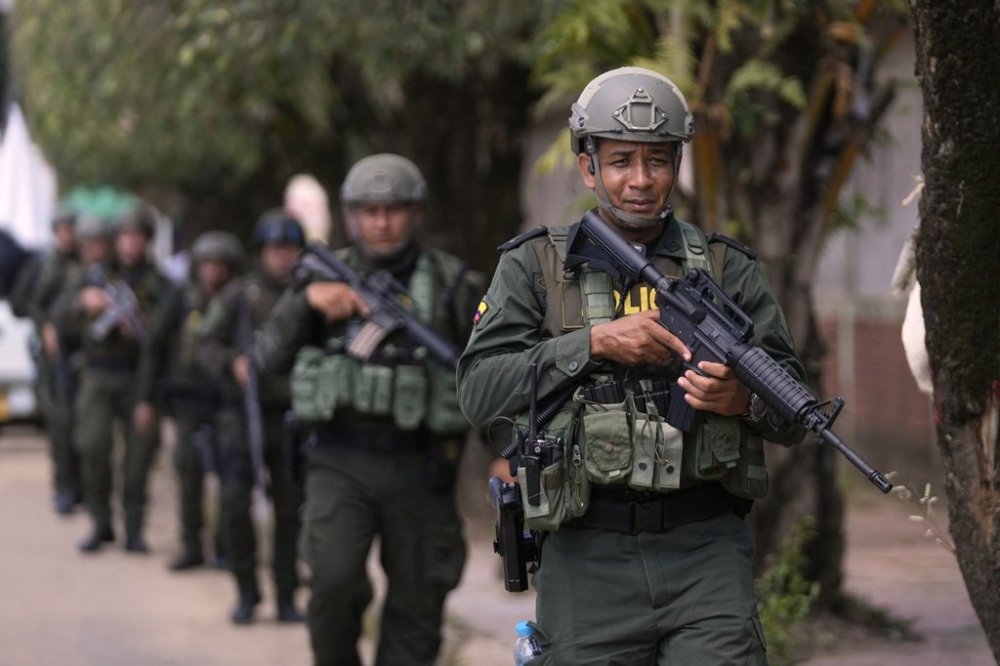Colombia president decrees emergency powers to restore order in coca region wracked by rebel combat
Advertisement
Read this article for free:
or
Already have an account? Log in here »
We need your support!
Local journalism needs your support!
As we navigate through unprecedented times, our journalists are working harder than ever to bring you the latest local updates to keep you safe and informed.
Now, more than ever, we need your support.
Starting at $15.99 plus taxes every four weeks you can access your Brandon Sun online and full access to all content as it appears on our website.
Subscribe Nowor call circulation directly at (204) 727-0527.
Your pledge helps to ensure we provide the news that matters most to your community!
To continue reading, please subscribe:
Add Brandon Sun access to your Free Press subscription for only an additional
$1 for the first 4 weeks*
*Your next subscription payment will increase by $1.00 and you will be charged $20.00 plus GST for four weeks. After four weeks, your payment will increase to $24.00 plus GST every four weeks.
Read unlimited articles for free today:
or
Already have an account? Log in here »
Hey there, time traveller!
This article was published 24/01/2025 (317 days ago), so information in it may no longer be current.
BOGOTA, Colombia (AP) — Colombia’s president issued a decree Friday giving him emergency powers to restore order in a coca-growing region bordering Venezuela wracked in recent days by a deadly turf war among dissident rebel groups.
President Gustavo Petro’s decree gives him 90 days, which can be extend, to impose curfews, restrict traffic and take other steps that would normally violate Colombians’ civil rights or require congressional approval.
It is the first time in more than a decade that a Colombian president has used such an extreme measure and underscores the seriousness of the current conflict in a country that for decades was paralyzed by political violence.

However, it applies only to the rural Catatumbo region near the border with Venezuela, where the Colombian state has struggled for decades to gain a foothold. In the past week, at least 80 people have been killed and an estimated 36,000 more displaced as fighting intensifies between the National Liberation Army, or ELN, and holdouts from the Revolutionary Armed Forces of Colombia, or FARC.
Petro’s conservative opponents have criticized the move, accusing the former guerrilla of riding roughshod over the constitution. But some activists have celebrated it, saying they are hopeful the move translates into better infrastructure, health care and schools in the traditionally lawless region.
“Why are the armed groups here? Because the last government hasn’t made investments. They’ve abandoned us,” Jaime Botero, an activist in the town of Tibu, told The Associated Press.
Earlier this week Petro reactivated arrest orders against 31 top ELN commanders that had been suspended as part of an effort to woo the the Cuban revolution-inspired insurgency into a peace deal to end its 60 year war against the state. Petro also suspended all peace talks, which have advanced slowly since he took office in 2022.
The ELN has traditionally dominated in Catatumbo but has been losing ground to holdouts from the FARC, a guerrilla group that largely disbanded after signing a peace deal in 2016 with the government.
The current conflict is spilling across the border into Venezuela, where some of those fleeing the violence have sought refuge.
The current whereabouts of the ELN peace negotiators is unknown. But Cuba’s government this week said they are not there, leading some to speculate they may be hiding in Venezuela, which is one of the sponsors of Petro’s peace initiative with the ELN.
